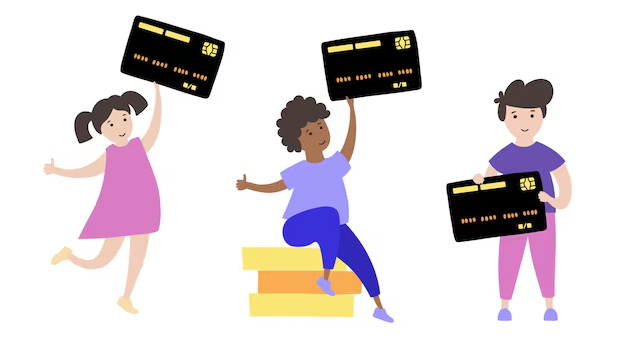Navigating the world of credit cards in the United States can be overwhelming, especially for newcomers. Whether you’re a student, an immigrant, or simply someone trying to build credit for the first time, understanding how to choose and use a credit card responsibly is crucial.
Credit cards offer numerous benefits, from convenience to building a solid credit history, but they also come with potential pitfalls if not managed wisely. This guide aims to provide you with the foundational knowledge needed to make informed decisions, helping you get started on the right foot.
The importance of building credit

Building credit is one of the most important financial tasks you’ll undertake in the U.S. Your credit score impacts your ability to rent an apartment, buy a car, get a loan, and even secure certain jobs. For beginners, establishing credit can seem daunting, but it’s a necessary step toward financial independence.
The first step is understanding what a credit score is and how it’s calculated. In the U.S., credit scores range from 300 to 850, with higher scores indicating better creditworthiness. Factors such as payment history, credit utilization, length of credit history, types of credit, and recent inquiries all play a role in determining your score.
When you’re just starting out, your credit file is likely to be thin, meaning you have little to no credit history. This can make it challenging to qualify for traditional credit cards. However, some credit cards are specifically designed for beginners, offering easier approval terms.
Choosing the right credit card
When choosing your first credit card, it’s essential to consider a few key factors to ensure you select the right one for your needs. The type of card, interest rates, fees, and rewards are all important considerations. For beginners, the decision often boils down to choosing between a secured credit card and a student credit card. Secured cards require a security deposit, which typically becomes your credit limit.
Interest rates, often expressed as an Annual Percentage Rate (APR), are another critical factor. The APR is the cost of borrowing money on your credit card if you don’t pay off your balance in full each month. For beginners, it’s crucial to look for a card with a low APR, as this will minimize the interest you pay on any carried balance.
Additionally, be aware of any fees associated with the card, such as annual fees, late payment fees, and foreign transaction fees. Some starter cards come with no annual fee, which can be a great way to keep costs low while you’re building credit.
Rewards programs are another aspect to consider. While it might be tempting to choose a card with the most enticing rewards, such as cash back, points, or travel miles, it’s essential to prioritize cards that help you establish and build credit over those with attractive rewards. Remember, the primary goal of your first credit card should be to develop good credit habits and build a solid credit history.
Responsible credit card use
Using a credit card responsibly is critical to building and maintaining a good credit score. One of the most important rules to follow is to pay your bill on time, every time. Payment history accounts for 35% of your credit score, making it the most significant factor in credit scoring.
Even one missed payment can have a substantial negative impact on your score and can stay on your credit report for up to seven years. Setting up automatic payments or reminders can help ensure you never miss a due date. Another key aspect of responsible credit card use is keeping your credit utilization low. Credit utilization refers to the percentage of your credit limit that you’re using at any given time.
For example, if you have a credit limit of $1,000 and your balance is $300, your credit utilization is 30%. Experts recommend keeping your utilization below 30%, but ideally, it should be even lower to maximize your credit score. High credit utilization can signal to lenders that you’re over-reliant on credit, which can negatively affect your credit score.
Additionally, avoid the temptation to max out your credit card. It can be easy to overspend, especially if you’re new to using credit, but carrying a high balance can lead to high-interest charges and debt accumulation. Instead, aim to pay off your balance in full each month.
This not only helps you avoid interest charges but also demonstrates to lenders that you can manage credit responsibly. Over time, these habits will contribute to a positive credit history, which will open the door to more favorable credit products in the future.
Alternatives to traditional credit cards
If you’re unable to qualify for a traditional credit card, there are alternative options available that can help you build credit. One popular alternative is a secured credit card, which requires a security deposit that acts as your credit limit. Secured cards are often easier to obtain because the deposit reduces the risk to the lender. As you use the card responsibly, you can eventually transition to an unsecured card.
Another option is to become an authorized user on someone else’s credit card. This involves having someone, typically a family member, add you to their account. As an authorized user, you can use the card, and the account’s payment history and utilization are reported on your credit report.
This can be a great way to build credit, especially if the primary cardholder has a good credit history. However, it’s important to use this privilege responsibly, as any negative activity on the account could affect both your credit scores. Credit-builder loans are another alternative to consider.
These are small loans offered by some banks and credit unions specifically designed to help you build credit. The loan amount is held in a savings account while you make monthly payments. Once you’ve paid off the loan, the funds are released to you. The lender reports your payments to the credit bureaus, helping you establish a credit history.
Conclusion
Starting your journey with credit cards in the U.S. can be both exciting and daunting. The key to success lies in understanding the basics of credit, choosing the right card for your needs, and using credit responsibly. By focusing on building a solid credit history, you set the foundation for future financial opportunities, such as qualifying for loans, securing lower interest rates, and accessing better credit card offers. Remember, your credit history is a valuable asset, so treat it with care and patience as you work toward your financial goals.





